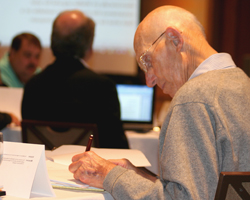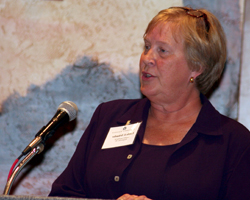
Senior Lawyers Division Representative Joe Melli prepares before speaking about a civil Gideon petition currently pending before the Wisconsin Supreme Court. The Senior Lawyers Division declined to take a position regarding the petition.

State Bar President Jim Brennan voices support for a policy encouraging civil Gideon in principle.

Linda Schaefer, president-elect of the Door County Bar Association, welcomes the Board of Governors to Sturgeon Bay.

The Board of Governors gather for a group photo after day one’s actions on immigration policy, the State Bar’s dues rebate process, and the Elder Law Section’s request to file an amicus brief.
Sept. 26, 2011 – The State Bar of Wisconsin’s Board of Governors (Board) recently voted to take policy positions related to immigration and a right to counsel in certain civil cases, known as civil Gideon.
The Board also approved the Elder Law Section’s request to file an amicus brief in a pending case before the Wisconsin Supreme Court relating to civil commitments of persons with Alzheimer’s disease, and adopted recommendations to improve the current bar dues rebate process, among other actions at its Sept. 23-24 meeting in Sturgeon Bay.
In addition, the Board took time to honor the late Nathan Fishbach, a former member of the State Bar Board of Governors who died of cancer on Sept. 17. Fishbach’s colleague, District 2 Gov. Lisa Lawless, spoke of a man who worked “tirelessly” for his community.
“He was more than just a bar leader,” Lawless said. “He was a teammate who helped other people, mentored them, and encouraged them to do their best. We will remember him fondly.”
Board supports civil Gideon in principle
The Board voted to support policies that encourage or enhance the quality and availability of legal services to the public. That position responds to a pending petition (10-08) before the Wisconsin Supreme Court that would establish a right to counsel for low-income individuals in certain civil cases.
The Board did not disagree with nor support petition 10-08. However, in principle, the board's position reflects the State Bar's long-standing support of a judge’s authority to appoint legal counsel when, based on the circumstances of the case, there is a need to do so to ensure the process is fair.
John Ebbott, executive director of Legal Action of Wisconsin, filed the petition on behalf of various signatories, and asked the Board to support the petition.
In general, the petition seeks to amend Supreme Court Rule 11.02 by providing that in civil actions, an indigent litigant shall be appointed an attorney at public expense where the assistance of counsel is needed to protect the litigant's rights to "basic human needs, including sustenance, shelter, clothing, heat, medical care, safety and child custody and placement.”
Again, the Board voted to support policies that promote greater access to justice, but did not vote to support petition 10-08 outright. District 7 Gov. Bill Curran noted the State Bar must weigh civil Gideon with other State Bar initiatives, given the limited funding resources currently available.
Others commented that supporting civil Gideon in principle reflects the State Bar’s continuing effort to improve access to justice for low-income individuals but maintains the flexibility to navigate funding and other obstacles currently facing the justice system in Wisconsin.
Board takes policy position related to immigration
The Board unanimously adopted a policy position to oppose any state effort to regulate actions that conflict with the Supremacy Clause (Art. VI, Clause 2) of the U.S. Constitution.
Thus, the State Bar will oppose any state effort related to immigration that encourages a conflict to arise between federal law and either the state constitution or state law.
The policy responds to AB 173, which would require Wisconsin law enforcement officers to detain persons arrested or charged with certain civil or criminal violations when they have reasonable suspicion to believe that the person is not lawfully present in the state.
The Wisconsin Hispanic Lawyer’s Association, which requested the State Bar to take a policy position opposing the bill, believes the proposed law impermissibly regulates immigration, invites selective enforcement on the basis of prohibited classifications, and authorizes unlawful detention without probable cause. In the event a public hearing is held on AB 173, a State Bar representative would appear to make its policy position known to members of the Legislature.
Board approves amicus brief filing
By unanimous vote, the board approved the Elder Law Section’s request to file an amicus brief in the case of Fon du Lac County v. Helen E.F., on appeal to the Wisconsin Supreme Court.
The Elder Law Section opposes the use of Wis. Stat. ch. 51 mental commitment proceedings for a person with Alzheimer’s dementia. In this case, the trial court ordered Helen E.F., who suffers from Alzheimer’s, to be mentally committed and involuntarily medicated under ch. 51.
Helen E.F. appealed, and the District II Wisconsin Court of Appeals reversed, finding that Helen E.F. was not a proper subject for detainment or treatment under ch. 51 because Alzheimer’s disease is not a qualifying mental condition.
The amicus brief will argue to uphold the appeals court decision. The Elder Law Section believes a ruling that Alzheimer’s is a qualifying mental condition under ch. 51 would effectively invalidate advance planning through health care powers of attorney for most individuals with Alzheimer’s, creating unnecessary burdens on the court system, individuals, and their families.
Board accepts dues rebate committee recommendations
The Board unanimously approved the recommendations of a committee appointed to review the State Bar’s process for calculating bar dues rebate amounts. The committee recommended maintaining the current process, while making several improvements to the process.
Under Keller v. State Bar of California, 496 U.S. 1, 110 S. Ct. 2228 (1990), the State Bar of Wisconsin determines what activities can or cannot be funded with compulsory dues. A calculated rebate amount is available to members who object to use of non-chargeable dues.
The board voted to keep the current process of review in place, with improvements.
First, the State Bar will provide notice to all members with an invitation to attend the Keller review process performed by the State Bar’s Executive Committee. The materials and meeting agenda will be made available for those who wish to attend.
Second, department directors will be required to verify activities submitted by staff members and keep a list of suspected non-chargeable activities. Finally, the calculated rebate amount must be submitted to the Executive Committee for final approval.
Other business
The Board appointed Christine Rew Barden to complete the term of District 9 Gov. Patty Struck, who is currently serving as Board chairperson. The Board also appointed Paul Swanson to complete the term of District 3 Gov. Jessica King, who was elected to the Wisconsin Senate.
The Board also approved President Jim Brennan’s appointments to the Nomination Committee for the State Bar elections in April 2012. Those appointments are: President-elect Kevin Klein (chair), Bill Curran, Margaret Hickey, Athenee Lucas, and past-president Jim Boll.
